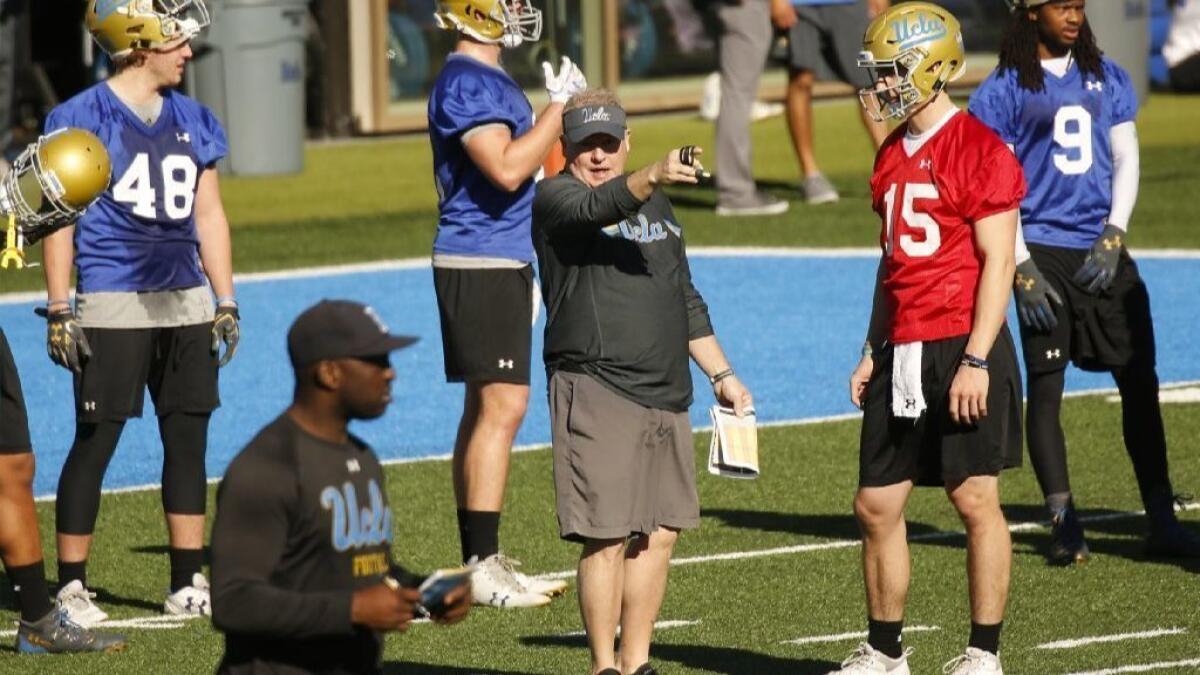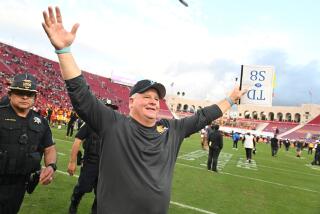UCLA’s Chip Kelly: a private man in a very public role

- Share via
This is the third of a three-part series on Chip Kelly, UCLA’s new football coach.
Chip Kelly stood beside the projector and drew a black rectangle behind a jumble of Xs and O’s. It signified an ambulance, oddly intermingling with receivers and linebackers on the white screen at a coaching clinic.
Moments earlier, UCLA’s new football coach had shown several dozen high school coaches gathered inside the Wasserman Football Center some of the counter moves the Washington Redskins famously used with their offensive linemen. Kelly noted how a young coach with players not properly schooled in the scheme might have watched them smack directly into each other behind the line of scrimmage.
Thus, the need for the ambulance.
The coaches chuckled at the image, the lighthearted moment commencing a lively two hours in which Kelly held everyone’s attention with more than his football wisdom. He made humorous asides, recalling how a post route was once referred to as “Bust Your Ass,” while dropping in a random cultural reference from “Happy Days.”
When the coaches rose from their plush leather seats, several encircled Kelly to hear more. It felt like nobody wanted to leave.
If he didn’t have a football team to save, Kelly might be suited to become a headliner at the Laugh Factory. He’s personable, funny and engaging … so long as the topic is football and he’s willing to grant you an audience.
He didn’t agree to be interviewed for this or two previously published articles in this series about his career.
Colleagues who worked alongside him for six years at Oregon didn’t know he had been married and divorced until after he left for the NFL.
“When I first heard that,” said Dave Williford, Oregon’s recently retired sports information director, “my initial thought was, no he wasn’t. Where is this coming from?”
John Neal, a former Ducks defensive backs coach, used to go on runs with Kelly along the Prefontaine Trail in Eugene, Ore. He said he knows little about Kelly’s preferences besides his love of “orange food” — French fries, breaded chicken and macaroni and cheese.
Mike Bellotti, Kelly’s boss at Oregon first as head coach and then as athletic director, said their conversations while recruiting together invariably revolved around football, player evaluations and the parents of prospects.
“I don’t think Chip and I ever had a conversation about his personal life in the three years that we worked together,” Bellotti said.
The pigskin-deep tone for their relationship was set when Bellotti offered Kelly a job as the Ducks’ offensive coordinator and Kelly didn’t immediately accept.
“I asked him why,” Bellotti said, “and it was either he didn’t have an answer or he wasn’t comfortable giving me the answer or he didn’t know.”
Kelly, 54, can be as caustic with reporters as he was accommodating with the high school coaches at the clinic. Yet he also can be expansive when a question captures his interest and often mixes in his own unmistakable brand of humor, joking that bubonic plague would be a worst-case scenario for something that might limit the availability of players during UCLA’s spring game.
The coach declines nearly all requests for one-on-one interviews. His explanation is that he’s a private person who prefers the focus to be on his players — never mind the five-year, $23.3-million contract that will make him one of college football’s top stories this fall.
Kelly did provide a dinner suggestion when a reporter informed him he was headed to his hometown of Manchester, N.H.: the Puritan Backroom. It’s a family restaurant where even the healthiest seafood items come fried and the house specialty is chicken tenders. The place also offers 36 flavors of ice cream, the line for Mint Oreo and other indulgences stretching from the takeout window into the parking lot on a late May afternoon.
While sitting on aluminum bleachers overlooking a track across the street from the restaurant, Bob Leonard, Kelly’s high school coach, said the root of Kelly’s reticence remained a mystery.
“I have no idea,” Leonard said. “It’s just his personality? Quiet power? I’m not sure. You know, he has a lot of self-confidence and always did.”
A few steps away on the track, Frank Kelley, one of Kelly’s high school teammates, rocked his body nervously when asked about his old pal’s personal life. Had Kelly, who wears a gold band on his left hand, remarried?
“We’re not going to say anything, OK?” Kelley said, the tone as if he might end the interview. “All right?”
A few of Kelly’s former coaching colleagues confirmed that Kelly did remarry, but only after an aborted wedding involving another woman in which a number of Ducks coaches had flown to New England.
The majority of (Oregon) boosters hated Chip; they were trying to get him fired when he was 46-7.
— Author Mark Saltveit, referring to Chip Kelly’s record with the Ducks
Kelly is reluctant to share much of anything with anyone besides a small batch of friends from New England. He flew them to games when he coached Oregon, putting them up in the luxury box he had negotiated into his contract, and paid the expenses of a few who accompanied him to run with bulls in Pamplona, Spain, during the summer of 2012. It seemed an unlikely alliance to some observers.
“They were fun guys, kind of boisterous,” Williford said of Kelly’s friends. “You didn’t see necessarily the two of them together. I mean, Chip was so reserved and close to the vest and they would come for the weekend to games and to have fun.”
Among Kelly’s dearest friends is Sean McDonnell, the longtime New Hampshire coach who has known Kelly for four decades. McDonnell said Kelly’s strongest allegiances lie with his widowed mother, his two dogs and the people who contributed to his coaching rise.
“He’s never forgotten who helped him get there and how he got there,” McDonnell said.
It can be difficult for those outside Kelly’s inner circle to differentiate legend from fact. There was a story that the self-described minimalist’s sprawling, custom-built house in Eugene contained only a television and a sofa. Williford never saw the home but called a local furniture store owner to have it fully outfitted before a recruiting weekend that Kelly was set to host.
“He ended up buying all of the furniture there,” Williford said, “just because it wasn’t a priority of his” to shop.
Kelly became even more reserved as Oregon soared into national prominence, closing practices to the media and scaling back appearances with boosters. Going out in public also became something of an ordeal.
“He said to me, ‘I can’t even go to the store anymore without people following me around and asking me all kinds of questions,’ ” Neal said. “… So maybe there’s a bit of shyness to him that got exposed when he got put in the limelight.”
It was a paradox of sorts considering that whenever Kelly materialized in front of boosters, he seemed at ease and cheerful. If he was cringing inside, no one could tell.
Maybe it helped that some of Kelly’s responsibilities with fans were lessened in 2009 when Bellotti moved from coach to athletic director, allowing Bellotti to make public appearances on Kelly’s behalf. But some people never saw Kelly as accommodating enough with the fan base.
Mark Saltveit, who has followed Kelly closely while writing books about his coaching philosophies and first two seasons with the Philadelphia Eagles, said Kelly offended Oregon boosters by refusing to make the two-hour drive from Eugene to Portland for major events.
“The majority of boosters hated Chip; they were trying to get him fired when he was 46-7,” Saltveit said, referring to Kelly’s record at the school. “And you know the history of the Ducks; they went entire decades where they didn’t have 46 wins, so a guy who finished top five in the nation every year he was there and they’re trying to get him fired?”
One widely held theory as to why Kelly opted to make his return to college coaching at UCLA instead of Florida was because of the relative anonymity that Westwood offered versus Gainesville, where his every move would be dissected by Gators fans. Bellotti said he didn’t believe the demands of fans made any appreciable difference.
“I don’t think you have to do that anywhere less than anywhere else,” Bellotti said. “I don’t think UCLA boosters, Florida boosters, Oregon boosters, Texas A&M boosters — you’ve got to be available to them on the basis of whatever you decide and you set up or your president, athletic director or board of regents tells you, ‘Hey, there’s certain things you need to do and certain things we’ll figure out how to do.’ ”
Rick Neuheisel, the former star UCLA quarterback turned Bruins coach, said he’s sure the expectations for Kelly’s schmoozing were made clear before he accepted the job. Neuheisel said his obligations included attending booster events in Los Angeles and Orange counties in addition to fundraisers at private residences and a golf outing in Lakeside.
“They’re all over the place,” Neuheisel said of the booster responsibilities, “and how much you can be involved and how impactful you can be is all relative based on timing and your availability.”
Ultimately, Kelly seems to do what he wants, one of the privileges of winning. His success at Oregon and in his first two seasons with the Eagles made him the most highly coveted coach available late last year when he agreed to succeed Jim Mora at UCLA.
He was in funnyman mode at his introductory news conference inside Pauley Pavilion, cracking that his minutes-long opening monologue was the longest he had talked in his life. Kelly didn’t have nearly as much to say in the spring during interview sessions with reporters filled with as many awkward pauses as insightful answers.
Which persona more accurately portrayed the man? Well, both.
“He’s smart, he’s funny, he’s observant — he’s all those things,” said McDonnell, Kelly’s longtime friend. “He’s really good at it. But he wants to be private because that’s his choice.”
More from the series:
The making of a beautiful mind: Chip Kelly’s early coaching days
More to Read
Go beyond the scoreboard
Get the latest on L.A.'s teams in the daily Sports Report newsletter.
You may occasionally receive promotional content from the Los Angeles Times.







